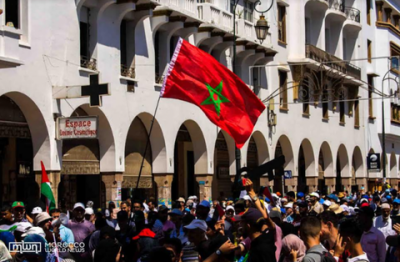‘Palestine Is a Red Line’, Morocco-Israel Relations, Netanyahu’s “Normalization” Machine? Moroccan Writers Boycott UAE, Israel
The Moroccan writers condemn “any normalization” of relations with Israel, describing commitment to Palestine as a “red line.”

Five Moroccan authors have announced their decision to boycott an Emirati literary prize in objection to the UAE’s “normalization” deal with Israel, Spanish newspaper EFE reported Saturday.
According to the report, the Moroccan writers all expressed their dismay and disappointment at the UAE for abandoning the Palestinian cause. It transpired in the writers’ individual statements that commitment to the Palestinian cause is of utmost importance to them.
‘Modest show of solidarity’
Writer Yahya Ben El Oualid announced his stance on his Facebook page, according to the same source. In his message, El Oualid revealed that he entered the UAE’s prominent Sheikh Zayed literary contest one month ago with his most recent book on “Arab intellectuals.”
With Abu Dhabi having normalized relations with Israel, however, the Moroccan writer wrote to the organizers to inform them that he no longer wished to be associated with the contest.
“Normalization between Emirati politicians and the usurper zionist entity led me to definitively and voluntarily withdraw my application,” the Moroccan writer said. He wants to describe his move as “a modest show of solidarity with our Palestinian people.”
Following in El Oualid’s footsteps, Moroccan novelists Zohra Ramij, Ahmed Elluizi, and Abu Youssef also declared they were withdrawing from consideration for the Sheikh Zayed literary prize.
In a similar move, Moroccan academic Abderrahim Jairan announced his resignation from “Mawrouth,” a prominent Emirati cultural magazine published by the Sharjah Heritage Institute.
He also said his resignation was a show of solidarity with the Palestinian cause, which he suggested is “a red line” for Moroccans. “Palestine is a red line and any normalization with the zionist entity … should be rejected.”
The agreement to normalize relations between Israel and the UAE has unsurprisingly divided opinions. The Trump administration has hailed the news as a “historic breakthrough” for the longstanding Middle East conflict.
The overwhelming majority of commentators and longtime observers have, however, condemned what they described as a death sentence for the potential Palestinian state.
Guardian columnist Jonathan Freedland wrote that the deal amounts to normalizing Israeli occupation and “closing off the possibility of Palestinian self-determination.”
Morocco and Israeli normalization
In the meantime, however, while the Arab world has almost unanimously lambasted the deal, there have been reports of similar agreements between Israel and five other Arab countries in the coming months.
Morocco, which has long been rumored to be among countries that may normalize relations with Israel, is again being cited, albeit without evidence, as part of the Arab countries expected to normalize relations with Israel in the near future.
The main argument in such rumored reports, often known to be self-serving leaks from Netanyahu’s close circles, has long been that Morocco’s commitment to continued cooperation with the US may eventually lead to normalization with Israel.
Central to the argument is the claim that Rabat’s push for a more pointed American support for its Western Sahara stance may end up superseding its commitment to Palestine, leading it to take the normalization bait.
Last February, Morocco’s Minister of Foreign Affairs Nasser Bourita unwittingly gave renewed vigor to the rumors when he controversially said that Moroccans “must not be more Palestinian than Palestinians themselves.”
Amid the ensuing controversy, however, Morocco was quick to set the record straight, reiterating its “principled” and “constant” commitment to the “just Palestinian cause.”
Netanyahu’s normalization machine
For Israel’s founding Zionist generation, normalization with as many Arab countries as possible was the ultimate goal. Far from a simple act of diplomatic rapprochement, they perceived “Arab normalization” as the single best guarantor of legitimization and acceptance in the region.
This, and Netanyahu’s own electoral ambitions, are most likely to drive the Israeli PM to activate his communication machine in the coming month to pitch himself as the leader who brokered unprecedented, historical overtures with the Arab world.
The coming months will see Netanyahu’s camp capitalize on “ongoing normalization talks with a number of Arab countries,” whether real or imagined.
Morocco, meanwhile, will inescapably find itself on the normalization spotlight. This has happened before, even if Rabat has repeatedly made it clear that its embrace of its Jewish community should not be conflated with its stance on the Israeli-Palestinian conflict.
As news made the rounds earlier this year that President Trump was personally brokering a deal between Morocco and Israel, Rabat’s response was adamantly pro-Palestine. In a series of statements — namely from the royal office and the Ministry of Foreign Affairs — Morocco suggested that it would not trade Palestine for US support in Western Sahara.
For an overwhelming number of Moroccans, commitment to Palestine is part and parcel of the Moroccan social fabric. With this, and no matter the fact that Western Sahara remains by far the most sensitive issue for Moroccans, it is highly unlikely that Rabat turns its back on Palestine.
But that doesn’t mean that Netanyahu’s normalization machine will relent. So expect the frenzied, and most probably unsubstantiated Morocco-Israel normalization talks in the coming weeks and months. Just as you should expect a series, equally relentless, of Moroccan statements denying the reports from newspapers’ “sources close to the dossier.”
*
Note to readers: please click the share buttons above or below. Forward this article to your email lists. Crosspost on your blog site, internet forums. etc.
Featured image: Anti-normalization protests in Rabat (Source: Morocco World News)

